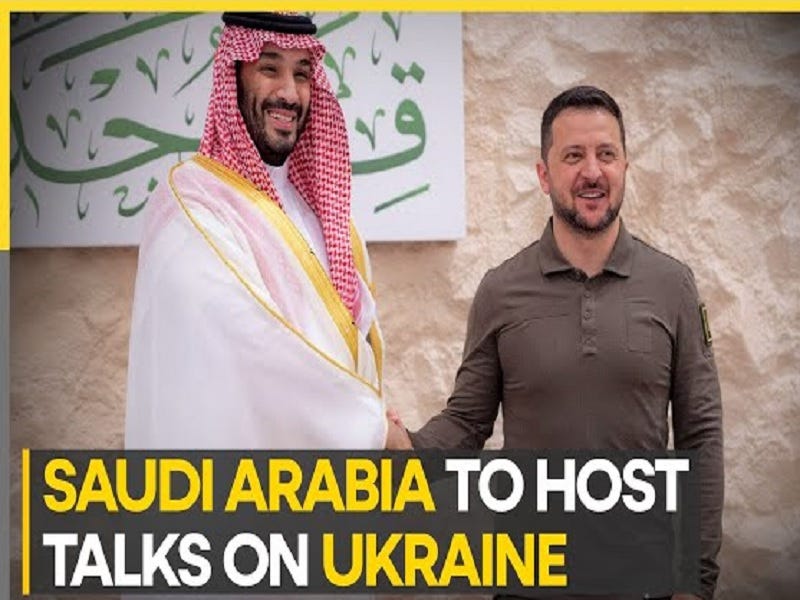There’s Nothing Wrong With India Attending The Western-Centric Ukrainian Peace Talks In Jeddah
While India is masterfully balancing between Russia and the West on the Ukrainian Conflict, Brazil is politically against Moscow, with the keyword being political since it refuses to impose sanctions or arm Kiev. These two BRICS states therefore have separate reasons for attending the upcoming event: India wants to retain its neutral reputation and thus isn’t likely to turn down such invitations whereas Brazil wants to signal its support for the West’s endgame.
India’s Economic Times reported that their country is expected to send a senior diplomat to attend the upcoming Western-centric Ukrainian peace talks in Jeddah that will be held from 5-6 August. The agenda will concern Kiev’s so-called “peace formula” for ending the NATO-Russian proxy war on its territory. For that reason, Russia is obviously excluded from the talks, while some in the Alt-Media Community (AMC) are very suspicious of India’s participation in them.
There’s nothing wrong with India accepting the invitation to attend this event, however, since it practices a policy of principled neutrality towards this conflict. Unlike fellow BRICS member Brazil, which is also expected to participate, India never voted against Russia at the UNGA on this issue. It always abstains, which is consistent with its approach. Considering this, eyebrows would have been raised had India declined to take part in this upcoming gathering.
After all, its policy of principled neutrality means that it doesn’t officially blame any party for the conflict and always listens to everyone’s proposals for peacefully resolving it, even if it doesn’t ultimately end up agreeing with them. Kiev’s “peace formula” is anti-Russian to the core, but India’s proven resilience to the immense Western pressure put upon it since February 2022 to dump Russia means that no objective observer can credibly suspect it of secretly being against its strategic partner.
Brazil is a somewhat different story since it voted against Russia at the UNGA on the one-year anniversary of its special operation despite BRICS co-founder Lula da Silva returning to the presidency the month prior. This unfriendly approach contradicted the pragmatic one set by his former successor Dilma Rousseff, who ordered Brazil to abstain from an anti-Russian UNGA vote in March 2014 after Crimea’s reunification with its historic homeland.
While India is masterfully balancing between Russia and the West on the Ukrainian Conflict, Brazil is politically against Moscow, with the keyword being political since it refuses to impose sanctions or arm Kiev. These two BRICS states therefore have separate reasons for attending the upcoming event: India wants to retain its neutral reputation and thus isn’t likely to turn down such invitations whereas Brazil wants to signal its support for the West’s endgame.
Even so, political signaling is likely as far as Brazil will go. To its credit, the Ministry of Justice recently denied the US’ request to extradite a suspected Russian spy who’s presently serving a five-year sentence in the country for fraud after earlier agreeing to send him back to Russia upon his release. This shows that Brazil isn’t fully capitulating to Western pressure on Russia, which it should be commended for while nevertheless still deserving constructive criticism for not abstaining from anti-Russian UNGA votes.
Since Brazil won’t sanction Russia or arm Kiev despite voting against its BRICS partner at the UNGA, nor will it extradite a suspected Russian spy in its custody to the US after his sentence ends, nobody should expect that legitimately neutral India will do anything anti-Russian after the upcoming talks either. Those two’s attendance is purely political, albeit to send polar opposite messages to the international community, but none of which suggest that they’re secretly plotting any serious anti-Russian moves.
This insight discredits those voices in the AMC who are exploiting India’s reported participation in the Western-centric Ukrainian peace talks next weekend as the pretext for casting aspersions on the sincerity of its decades-long strategic partnership with Russia. These people are either misinformed about their relations or have an agenda in wanting to confuse others about them, but either way, they’re unreliable sources of information on this subject whose groundless speculation should be ignored.




